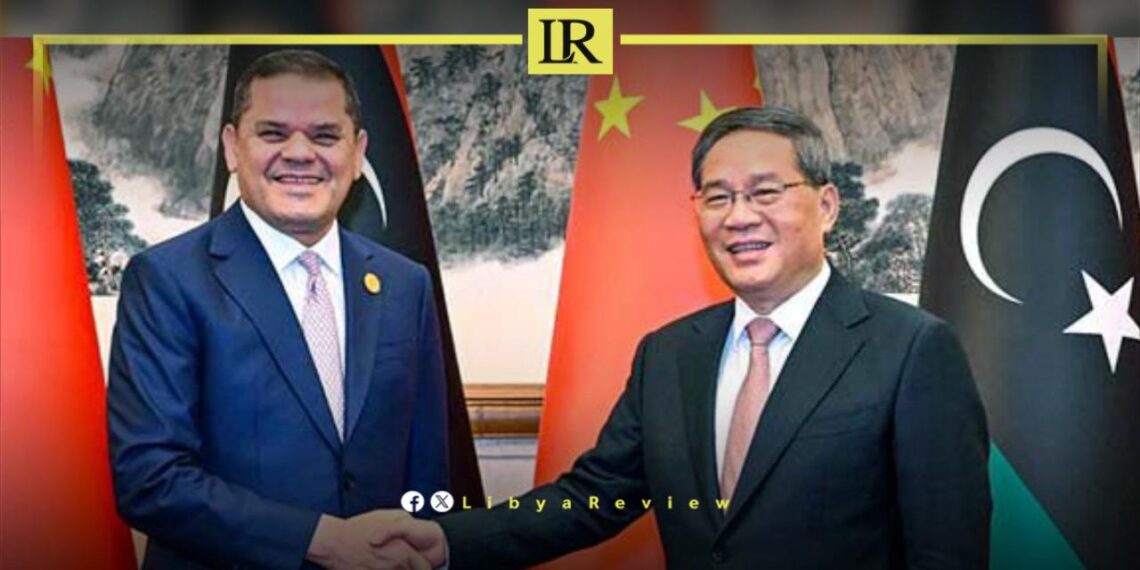Beijing and Tripoli are rebuilding ties after China withdrew its investors in 2011. However, Libya’s political division could pose challenges, according to a report published today by the English-language South China Morning Post in Hong Kong.
Before the 2011 revolution that ousted late lone-time leader Muammar Gaddafi and led to a bloody civil war in Libya, China had extensive interests in the oil-rich North African state. At that time, 75 Chinese companies controlled 50 major projects with a contractual value exceeding $20 billion, according to the Chinese Ministry of Commerce.
Intensive Chinese investments, including oil, construction, railways, and telecommunications, abruptly halted after some companies were raided and dozens of workers were seriously injured. This prompted Beijing to act swiftly to evacuate its citizens from the unrest. During the crisis, 35,860 Chinese nationals were evacuated from the country, marking the largest official evacuation abroad since the founding of the People’s Republic of China in 1949. As the security situation deteriorated, China suspended new investments, a situation that remained relatively unchanged until now.
Currently, Libya is divided between two administrations: the Government of National Unity based in Tripoli in the west, and the rival House of Representatives government-designated government in the east.
Recently, signs have emerged of China’s willingness to return to the energy-rich but politically divided country. On June 10, Mohamed Al-Hwaij, Minister of Economy and Trade in the Government of National Unity, issued a directive to activate the Libyan-Chinese Joint Economic Chamber, urging it to help build bridges and enhance investment communications between the two countries.
Senior officials in Tripoli and Beijing negotiated China’s return to Libya, which was among the issues discussed when the GNU Prime Minister Abdul Hamid Dbaiba visited China in late May. He held talks with Premier Li Qiang and Foreign Minister Wang Yi on the sidelines of the 10th Ministerial Conference of the China-Arab States Cooperation Forum, discussing the restoration of political and economic cooperation between the two countries.
Li expressed China’s readiness to work with Libya to harness the potential for cooperation under the Belt and Road Initiative, enhancing collaboration in infrastructure construction and providing more support for Libya’s development. He hoped Libya would offer a fair and non-discriminatory business environment for Chinese companies.
Meanwhile, Wang also offered China’s support, stating, “China has always supported Libya’s stability and development… and the Libya-led and Libya-owned political transition process.” Dbaiba, in turn, appreciated China’s significant role in supporting the political process and national reconstruction in Libya.
The meetings also discussed resuming operations at the Chinese embassy in Tripoli.
However, according to David Shinn, an expert on China-Africa affairs and professor at George Washington University’s Elliott School of International Affairs, Libya’s ongoing political instability could prove problematic. He said, “China supports a unified Libya and encourages dialogue as a solution to their differences.” Shinn noted that Libya exported $36 billion worth of oil in 2023, with China accounting for $2.2 billion of this total.
He indicated that China wants to re-engage in winning infrastructure contracts, while the Government of National Unity seeks the return of Chinese companies. “Nonetheless, political instability remains a concern,” Shinn said. “Any major re-engagement in the country requires the reopening of China’s embassy in Tripoli.”
John Calabrese, a senior fellow at the Middle East Institute in Washington, stated that before the Libyan civil war, China’s three state-owned energy giants—China National Petroleum Corporation, China National Offshore Oil Corporation, and China Petroleum and Chemical Corporation—had projects in Libya. He suggested that recent developments might relate to these companies wanting to recoup losses and reestablish themselves for potential profitable operations.
Calabrese noted that China had dealings with both sides during the second Libyan civil war (2014-2020), similar to its approach in other conflicts, such as in Afghanistan and the Saudi-Iranian conflict. “Somehow, they managed to avoid permanently alienating either of the competing camps.”
“If China doesn’t help in reconstruction, who will? Europeans arguably should, and as far as I can tell, Washington has tended to hand this poisoned chalice to them. Perhaps Beijing sees an opportunity to step in, leveraging European partners’ preoccupations with other urgent priorities.”
Mohamed Soliman, a global strategy advisor at McLarty Associates, indicated that reopening the Chinese embassy could signify strengthening diplomatic ties and bolstering political structures in Tripoli. “Chinese companies have a track record of quickly and efficiently executing large-scale projects, essential for Libya’s reconstruction,” Soliman said, adding that China’s involvement in Libya’s reconstruction aligns with Beijing’s broader interests in the Mediterranean and North Africa.
“With Italy stepping back from the Belt and Road Initiative, Libya’s strategic location at the crossroads of Africa, Europe, and the Middle East could make Tripoli a gateway for Chinese investments in the broader region, furthering China’s Belt and Road objectives.”


